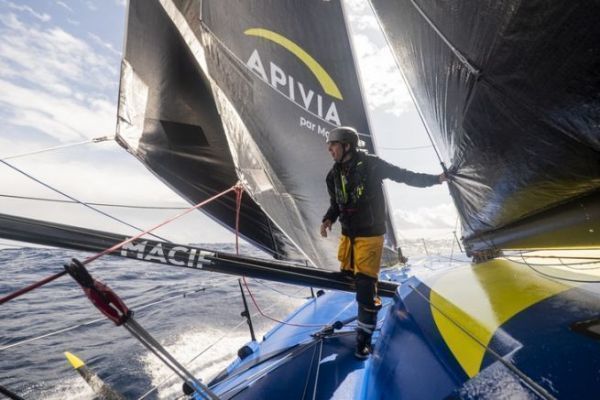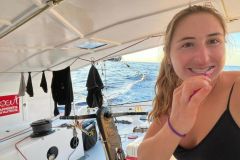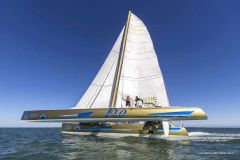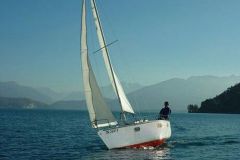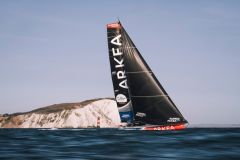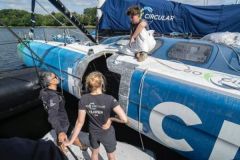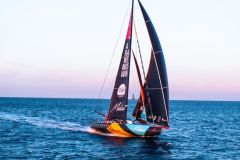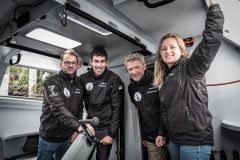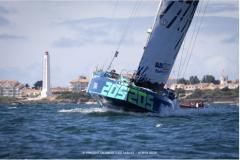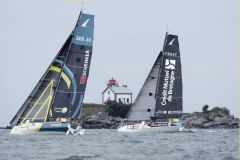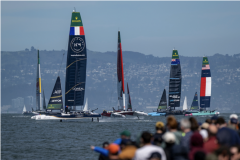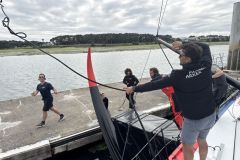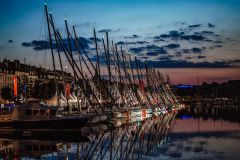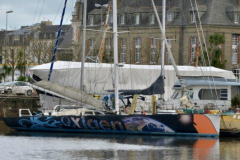In the hands of your new boat since the summer of 2023, what analyses and comparisons can you draw? In particular, how do you compare with the old Apivia?
We're very pleased. We've made real progress on the elements we wanted, especially downwind VMG. The boat crashes less and there's less water on deck. It's clearly a big improvement over Apivia. We've also made a lot of progress in terms of ergonomics. Apivia was good, but not perfect. During the Vendée Globe 2020, I realized that some things weren't very practical. My galley was only on one side. When I was inside on starboard tack, I had to go around the boat to get to my stove. Then I'd come back with my freeze-dried food in the other direction... It was a lot of long trips.
When I did a maneuver, a tack or a gybe, as I didn't have a fixed navigation station, I had to move my footstool, rotate my chart table... In addition to the matossage, the maneuvering, I had to move the living space. It wasn't practical. It cost me extra time and energy.
On the new boat, with the very compact aft living area, when I'm at the chart table, I have my stove right next to it, so I can cook without moving. About 50 cm to the right, I have my sleeping bench. I don't switch positions. It's always the chart table to port and the bench seat to starboard.
The cockpit is 1 m forward, and ergonomics have improved considerably. Apivia's cockpit closure wasn't super-tight. Closed, it had a greenhouse effect. When I sailed in hot zones, I had to choose between getting wet from the spray or sweating. We designed a system that allows the cockpit to be ventilated. Even when it's completely closed, I still get fairly effective ventilation. We added some freeboard forward to give me a bit more sea clearance. For manoeuvres, it's a little safer.
Are all these choices the result of your first Vendée Globe?
Yes, from the first 4-year cycle. The aim was to reinject all the experience of this first cycle into this new boat.
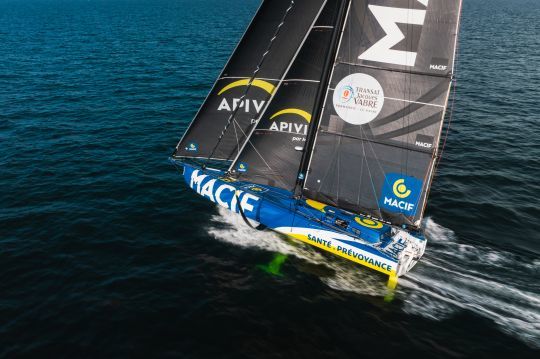
You've only taken part in one race for medical reasons. How are you getting on?
We would have liked to have done these two races, because we lack comparative data with the others. We also have a few fewer miles, even though we sailed 5,000 miles in 2023, which is no mean feat either. I have every confidence in the team's ability to have a perfectly reliable boat for the start of the Vendée. We're not starting from scratch. We're starting from Apivia, so there are quite a few systems inspired by what we had on the old boat. The boat was immediately very reliable. We couldn't have won the Fastnet with just 5 days of sailing, if the boat hadn't been fine.
Of course, there are few unknowns compared with the competition. I re-sailed at the beginning of December. We took advantage of being in France to make some small modifications to the boat, things we wouldn't have been able to test if we'd done the two transatlantic races. We're trying to find something positive in all this. This has enabled us to refine our choices for our winter refit. We're also launching the boat with a new pair of foils. This was planned from the start. The reason we're making this new pair is to have a spare pair for the start of the Vendée, as they take a long time to manufacture. If we have to make a new pair, we'll try to improve it and make a few changes to the details. We're one of those boats that are launched with new foils before the transatlantic races, while others do it afterwards.
What about qualification? Many of you still haven't obtained the famous sesame. What's going to happen?
That's another pitfall. The boat qualifies as a new boat, but I have to qualify according to the following rule: finish at least one of the two races within 150% of the time of the first. This is a bit new for me. I've never sailed like that before. Even so, I'm going to have to give it my all. I don't really know how I'm going to tackle it. That's easy to say now, but when I'm aboard with the others, it won't necessarily be easy to take it easy. It's not my way. I'm a bit apprehensive about that aspect. The aim is to get this point out of the way on The Transat and to be able to accelerate on the way back.
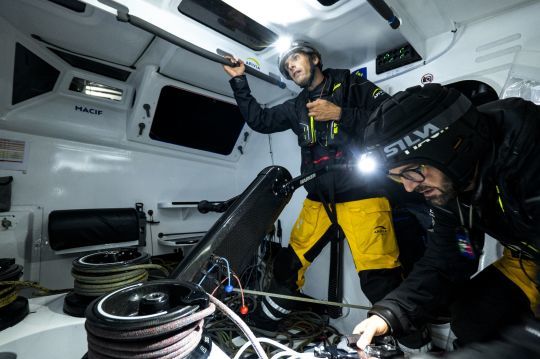
This will be your second Vendée Globe, how do you feel compared to the first? Apart from the competition, are your goals the same as the first time? Are you in the same frame of mind?
The aim of the first one was to win it, and that didn't go far, for reasons we all know... I'm approaching it well. I'm happy to be back there, back in the southern seas with this improved boat. I've sort of demystified what the south means to me, and being at sea for so long. I had tried to build a vicarious experience for the first time. I'd asked François Gabart, Armel le Cléac'h and Michel Desjoyeaux for advice. They'd all given me their advice, which was good. But I still came prepared. Today I know what it's like, what's going on, what the difficulties are. I'm approaching it a little more serenely, especially on this Indian-Pacific section. I'm going to be a little less stressed as I approach this part, which is a big part of the Vendée.
You came first in the last Vendée Globe, but ended up second overall. Is your aim to win this time?
Yes, that's the goal, but we have to remain humble. If there's one race where you can't predict victory, it's the Vendée. There's always a lot going on, there are ups and downs, everyone has problems. I hope I don't have a problem that's too disabling or worse, that forces me to retire. The aim is to be in a position to win it by arriving in the port of Les Sables three weeks before November 10. Then the race will unfold as it will. You really have to go into the Vendée Globe with a sense of humility, even if I'm going to do everything I can to get there. It's too special and too long a race...
What lessons have you learned from your experiences as a crew in The Ocean Race?
It's given me a habit of sailing at very high speeds all the time. It quickly became the norm. At times, we were averaging almost 30 knots over an hour. It was going very, very fast. You get used to it. Crewed sailing is quite a different exercise. When you're sailing single-handed, you get used to managing your fatigue pretty quickly. With solo sailing, you're always on the edge. You find it hard to reinvent yourself, to find new ways of adjusting, because you're so tired. You adjust the boat the way you've learned it, and from time to time you come up with little tricks, but it takes a long time.
With a crew, you sleep your 4 hours. You arrive on deck, you've eaten, you're in good shape and you're fully focused on the boat's performance. What's more, maneuvering with a crew of four is easier, and therefore faster. It was quite nice to sail for a long time in top form, and to have a clearer mind in terms of how the boat feels, how it's behaving and what you can do to improve it. You don't have that latent fatigue that you never get rid of when you're sailing solo. You're at 100% of your mental and physical capacity, and you're able to think clearly. You also don't have the navigation, the strategy or the repairs to deal with... Everyone has a role to play, even the media. The mental load is much lighter, and you can concentrate on the performance. I found that really interesting. You put 100% of your brain time into fine-tuning the boat and making improvements to make it go even faster.
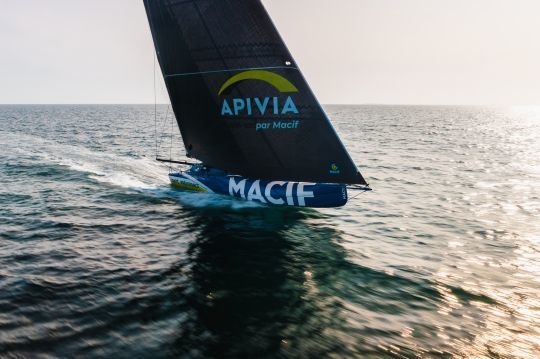
How do you see safety on a round-the-world voyage after your head injury on the Volvo and that suffered by other sailors?
This boat (editor's note: ex-11th Hour Racing Team) has done two, and it was on this one that Seb Simon was also injured. I was already starting to break before on Apivia. I forgot my helmet when I left for Newport, and I couldn't find one there. At the time, I was wearing rugby helmets. I realized that wasn't enough, so I switched to something a bit better. Of course, it's an important aspect. If what happened to me on The Ocean Race had happened to me solo, it wouldn't have been the same. I wouldn't have known what to say to the doctor, I wouldn't have known how to react.
On Apivia, I made a few glides. It always ended well. I've never hurt myself on the boat. Helmets have been part of my routine since Apivia. I've consolidated these routines since I've been on Macif. We're continuing to work to ensure optimum safety on the boat.
Safety devices are always one step behind. It's like in the car industry. Airbags and seatbelts were installed after accidents... Safety in means of transport is often linked to past problems. We have to try to anticipate as much as possible, but it's not easy.
You share the stable with Tom Laperche's Ultim, are there any bridges between Ultim and IMOCA?
Yes, completely. We share data processing management systems. In terms of structure, there are a few cross-functional people on the composite side, at electronics level. I was supposed to be part of Tom's routing team, but he went back to Cape Town before I joined Jean-Yves Bernot in La Rochelle. I'm thinking of inviting him to sail on the boat if he's available.
We talk a lot about autopilot settings, many computer interfaces and alarms. There's an interesting synergy. We're in the same design office, in the same open space, and we talk a lot. We're up to date on each other's projects. It's quite nice to have this emulation and collaboration.
How do you plan to manage your environmental impact on the race?
I think the measures announced are interesting. I think it's in the right order to add zones for whales. On Apivia, we had already put in a pinger and never touched a mammal. If it hasn't been scientifically proven to work, I think it's important to use what we can, existing technologies, to avoid this kind of thing. It's not good for anyone, mammals, boats or sailors. I'm in a good position to say so. I was careful not to sail within the limits of continental shelves. Near certain islands, in the drop-offs, that's where the whales often come to feed. Of course, you can't go all the way around the Bay of Biscay, but as far as the South Atlantic islands are concerned, I was careful to avoid the area or not to stay long. It's good to add these zones, but mammals don't have maps, so you can find them outside these zones. Overall, the Vendée Globe must be exemplary, because it's France's flagship ocean race, or at least the best known. It's important to be a leader in this field, and they've understood that. It's good to be proactive.

 /
/ 